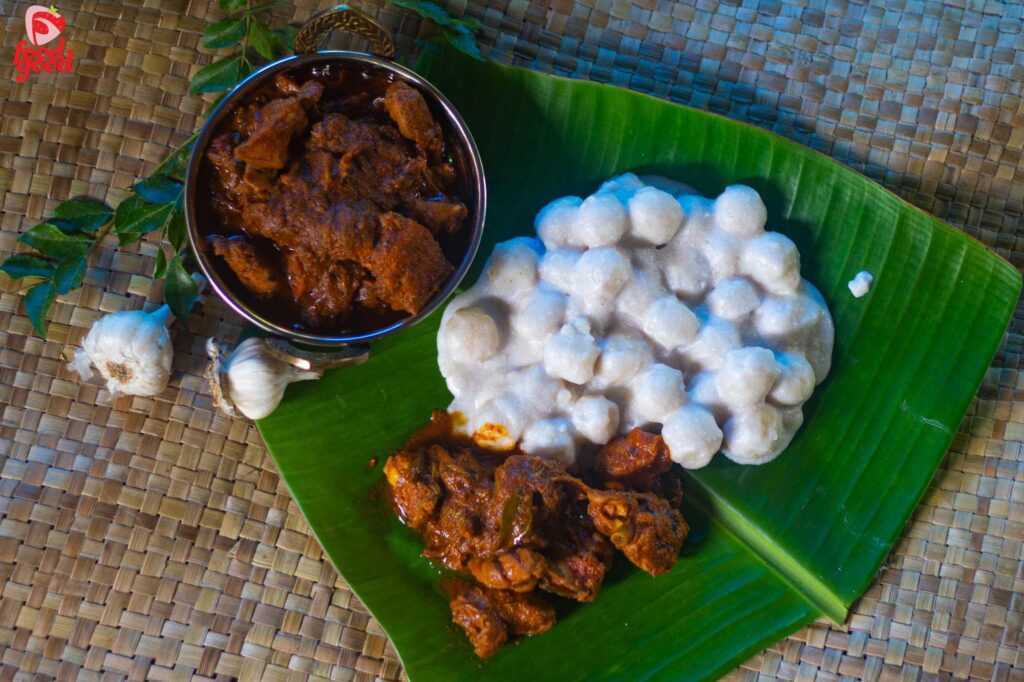Pal Pidi isn’t the kind of dish that gets made on a random weekday. It belongs to celebration. The kind of celebration that fills a Syrian Christian kitchen with soft voices, wood smoke, and the sound of a heavy lid being lifted from a clay pot.
It begins with pidi – small, smooth rice flour dumplings, gently shaped and cooked in coconut milk. Not sweet, not bland – just soft, comforting, and milky, with the faint warmth of shallots, a touch of garlic, and maybe a pinch of cumin. The coconut milk thickens slowly, coating each dumpling with a creamy layer that holds the memory of every stir.
But pal pidi doesn’t usually arrive on the table alone. It’s almost always served with something bold – buffalo curry, naadan chicken, or duck roast, rich with spice and depth. The mildness of the pidi soaks up the gravy, each bite carrying that contrast – soft and heavy, mild and fiery. It’s not just food. It’s balance.
Pal pidi is deeply rooted in Kuttanad, where backwaters and farmlands meet. For generations, it has been a centrepiece at Syrian Christian feasts – especially during Christmas, Easter, and weddings. Families pass down the recipe without needing to write it down. It’s cooked with muscle memory, and served with the kind of pride that only comes with tradition.
It’s a dish that speaks quietly but lingers deeply. Not flashy. Not loud. But if you’ve tasted it once, you’ll remember it every time the coconut milk simmers and the dumplings begin to rise.
Paal Pidi
Description
Pidi or Paal Pidi is a traditional breakfast dish loved by Syrian Christian families in the Kottayam region of Kerala. It's usually served with chicken curry and is popularly known as “Pidiyum Kozhiyum.” Let’s begin.
Ingredients
Instructions
-
First of all, we will prepare the rice flour. You can use Idiyappam or Pathiri flour for this recipe.
-
In a bowl, mix rice flour with half a cup of grated coconut. Combine well using your hand and set it aside for about 10 minutes.
-
While the flour is resting, extract coconut milk and keep it ready.
-
Now prepare a spicy coconut masala by grinding garlic, shallots, coconut, and cumin with a little water. Keep it aside.
-
Roast the rice flour and coconut mix gently, stirring continuously for some time on low flame.
-
Now add salt and water to the ground coconut masala and let it come to a boil.
-
Use this hot coconut masala mixture to knead the rice flour. Add the mixture little by little to the roasted flour and combine well.
-
Note: Both the rice flour mix and the coconut batter should be hot. If possible, prepare both simultaneously to maintain the right consistency.
-
Once mixed, allow it to cool slightly as the dough will be too hot to handle.
-
When warm enough, add a little ghee and knead it into a smooth dough. If needed, sprinkle some hot water to get the right texture.
-
Make small balls out of the dough and keep them aside.
-
To cook the Pidi, heat a thick-bottom pan and pour in 2 cups of coconut milk. Let it boil.
-
Gently add the rice balls into the boiling coconut milk and cook them slowly.
-
To thicken the mixture, take half a cup of coconut milk, mix in one tablespoon of rice flour, and stir it without lumps.
-
Add this to the cooking Pidi and mix well by gently swirling the pan. Avoid stirring directly with a spoon to protect the shape of the balls.
-
Let the Pidi cook until the mixture thickens and the water content reduces significantly.
-
Kottayam-style Pidi or Paal Pidi is ready. Serve warm with spicy chicken curry for an authentic traditional experience.


